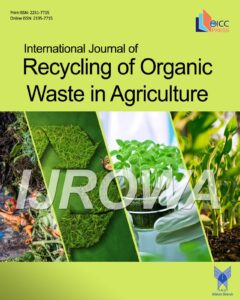Impacts of different organic amendments on soil degradation and phytotoxicity of metribuzin
Authors
- Mohammad Mehdizadeh 1
- Ebrahim Izadi-Darbandi 1
- Mohammad Taghi Naseri Pour Yazdi 1
- Mehdi Rastgoo 1
- Bizhan Malaekeh-Nikouei 2
- Hooriyeh Nassirli 3
Abstract
Purpose Persistence of herbicides in soil is a major concerning world issue due to their negative impacts on environment and human health. Laboratory and bioassay experiments were conducted to evaluate the effects of municipal waste compost (MC) and sheep manure (SM) on metribuzin degradation and phytotoxicity of this herbicide.
Method In degradation studies, soil samples were mixed separately with amendments at a rate of 2.5% (w/w) and metribuzin at a concentration of 5 mg kg−1 soil was used for fortification of selected samples. A liquid extraction method was chosen and final extracts were analyzed by HPLC. In bioassay study, the phytotoxic effects of different concentrations of metribuzin (0, 0.01, 0.05, 0.1, 0.2, 0.4, 0.8 and 1 mg kg−1 soil) on oilseed rape (Brassica napus L.) were evaluated.
Results The results indicated 88.8% degradation of metribuzin in MC during 120-day period followed by SM recording 72.2%, compared to non-amended soil where 59.8% of metribuzin were removed. The half-life was 119.48 days in no amended soil as compared to 87.72 and103.43 days in MC and SM application, respectively. MC was the most efficient treatment to accelerate metribuzin dissipation from the soil. Bioassay results showed that metribuzin residues had a negative effect on root and shoot biomass of oilseed rape. However, the root parameter was more sensitive than the shoot.
Conclusion It could be concluded that application of organic amendments to agricultural soils is an eco-friendly strategy to improve soil conditions and non-target crop protection as well as the removal of herbicide residues from soil environment.



